George Carlin Dies at 71
George Carlin, a comedian known for his combination of raunchy language and intellectual humor, died of heart failure last evening. He was 71.
Carlin was an interesting guy, combining brilliant observational humor with political activism. Like too many comics in the HBO era, though, it often seemed that he was vulgar and outrageous simply because he could rather than because it served his art. It’s one thing to point to the absurdity of seven words that we all know being taboo in adult settings; it’s quite another to use them constantly simply for their shock value.
Dean Goodman, Reuters, “Edgy comic George Carlin dies in L.A., aged 71”
Known for his edgy, provocative material developed over 50 years, the bald, bearded Carlin achieved status as an anti-Establishment icon in the 1970s with stand-up bits full of drug references and a routine called “Seven Words You Can Never Say On Television.” A regulatory battle over a radio broadcast of the routine ultimately reached the U.S. Supreme Court. In the 1978 case, Federal Communications Commission vs. Pacifica Foundation, the top U.S. court ruled that the words cited in Carlin’s routine were indecent, and that the government’s broadcast regulator could ban them from being aired at times when children might be listening.
The Grammy-winning Carlin remained an active presence on the comedy circuit. Carlin was scheduled to receive the John F. Kennedy Center’s prestigious Mark Twain Prize for American Humor in November and his publicist said Carlin performed in Las Vegas this month.
His comedic sensibility revolved around a central theme: humanity is a cursed, doomed species. “I don’t have any beliefs or allegiances. I don’t believe in this country, I don’t believe in religion, or a god, and I don’t believe in all these man-made institutional ideas,” he told Reuters in a 2001 interview. Carlin told Playboy in 2005 that he looked forward to an afterlife where he could watch the decline of civilization on a “heavenly CNN.” “The world is a big theater-in-the round as far as I’m concerned, and I’d love to watch it spin itself into oblivion,” he said. “Tune in and watch the human adventure.”
Keith St. Clair, AP, “Carlin, counterculture comedians’ dean, dies at 71”
Carlin’s jokes constantly breached the accepted boundaries of comedy and language, particularly with his routine on the “Seven Words” — all of which are taboo on broadcast TV and radio to this day. When he uttered all seven at a show in Milwaukee in 1972, he was arrested on charges of disturbing the peace, freed on $150 bail and exonerated when a Wisconsin judge dismissed the case, saying it was indecent but citing free speech and the lack of any disturbance. When the words were later played on a New York radio station, they resulted in a 1978 Supreme Court ruling upholding the government’s authority to sanction stations for broadcasting offensive language during hours when children might be listening. “So my name is a footnote in American legal history, which I’m perversely kind of proud of,” he told The Associated Press earlier this year.
Despite his reputation as unapologetically irreverent, Carlin was a television staple through the decades, serving as host of the “Saturday Night Live” debut in 1975 — noting on his Web site that he was “loaded on cocaine all week long” — and appearing some 130 times on “The Tonight Show.” He produced 23 comedy albums, 14 HBO specials, three books, a couple of TV shows and appeared in several movies, from his own comedy specials to “Bill and Ted’s Excellent Adventure” in 1989 — a testament to his range from cerebral satire and cultural commentary to downright silliness (and sometimes hitting all points in one stroke).
“Why do they lock gas station bathrooms?” he once mused. “Are they afraid someone will clean them?”
His longtime comedic partner Jack Burns says that Carlin was “fairly conservative,” both politically and stylistically, until he saw Lenny Bruce perform in the early 1960s.
“It was an epiphany for George. The comedy we were doing at the time wasn’t exactly groundbreaking, and George knew then that he wanted to go in a different direction.” That direction would make Carlin as much a social commentator and philosopher as comedian, a position he would relish through the years.
“The whole problem with this idea of obscenity and indecency, and all of these things — bad language and whatever — it’s all caused by one basic thing, and that is: religious superstition,” Carlin told the AP in a 2004 interview. “There’s an idea that the human body is somehow evil and bad and there are parts of it that are especially evil and bad, and we should be ashamed. Fear, guilt and shame are built into the attitude toward sex and the body. … It’s reflected in these prohibitions and these taboos that we have.”
Martin Weil, WaPo, “Comedian George Carlin Dies in Los Angeles at 71”
The New York-born performer, who also was an Air Force veteran, once summed up his approach:”I think it is the duty of the comedian to find out where the line is drawn and cross it deliberately.”
Carlin’s entertainment career began in 1956 at a radio station in Shreveport, La. while he was in the service.
Mel Watkins, NYT, “George Carlin, Splenetic Comedian, Dies at 71”
Mr. Carlin began his standup comedy act in the late 1950s and made his first television solo guest appearance on “The Merv Griffin Show” in 1965. At that time, he was primarily known for his clever wordplay and reminiscences of his Irish working-class upbringing in New York.
But from the outset there were indications of an anti-establishment edge to his comedy. Initially, it surfaced in the witty patter of a host of offbeat characters like the wacky sportscaster Biff Barf and the hippy-dippy weatherman Al Sleet. “The weather was dominated by a large Canadian low, which is not to be confused with a Mexican high. Tonight’s forecast . . . dark, continued mostly dark tonight turning to widely scattered light in the morning.”
[…]
In 1970, Mr. Carlin discarded his suit, tie, and clean-cut image as well as the relatively conventional material that had catapulted him to the top. Mr. Carlin reinvented himself, emerging with a beard, long hair, jeans and a routine that, according to one critic, was steeped in “drugs and bawdy language.” There was an immediate backlash. The Frontier Hotel in Las Vegas terminated his three-year contract, and, months later, he was advised to leave town when an angry mob threatened him at the Lake Geneva Playboy Club. Afterward, he temporarily abandoned the nightclub circuit and began appearing at coffee houses, folk clubs and colleges where he found a younger, hipper audience that was more attuned to both his new image and his material.
[…]
By the mid-’70s, like his comic predecessor Lenny Bruce and the fast-rising Richard Pryor, Mr. Carlin had emerged as a cultural renegade. In addition to his irreverent jests about religion and politics, he openly talked about the use of drugs, including acid and peyote, and said that he kicked cocaine not for moral or legal reasons but after he found “far more pain in the deal than pleasure.” But the edgier, more biting comedy he developed during this period, along with his candid admission of drug use, cemented his reputation as the “comic voice of the counterculture.”
Reactions from the blogosphere:
- Sean Hackbarth: “Carlin was entertaining enough, although I wasn’t a real fan. If I caught one of his acts while surfing HBO I’d watch a few minutes and laugh. He certainly found unique ways of looking at the world. He’ll be missed.”
- BNP: “What a loss for all of us. Carlin was more than a comedian: he was a brilliant critic in all sorts of realms.”
- Allie: “I’m going to miss George tremendously — rest in peace funny man.”
- Liza Sabater: “An amazingly simple legacy of free speech, civil disobedience, philosophy of language and culture criticism all wrapped up in the guise of stand up comedy.”
- Jill C.: “We’re living in a world of hypocrites, idiots, thieves, and morons — and now we don’t even have George Carlin to poke fun at them any more.”
- Kevin Aylward: “Carlin … mined comedy from the absurdity of words and fighting censorship.”
- Ann Althouse: “There are decades-old routines that spring to mind immediately as the most brilliant comic riffs I’ve ever heard…”
Memeorandum will doubtless have many more reax once people wake up to the news.

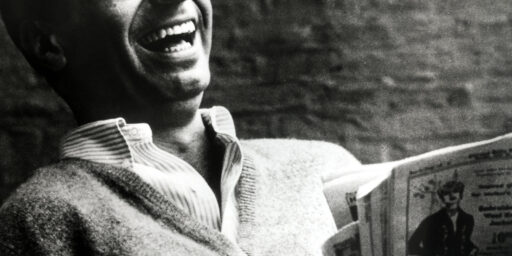
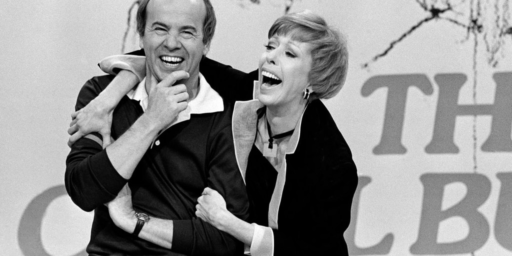
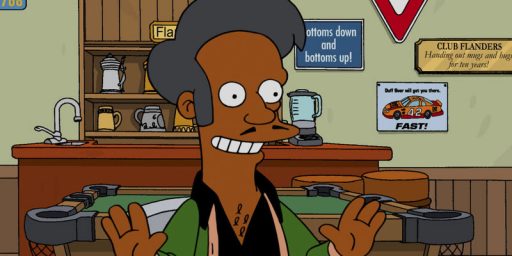
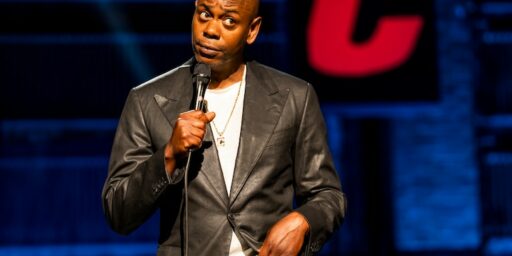
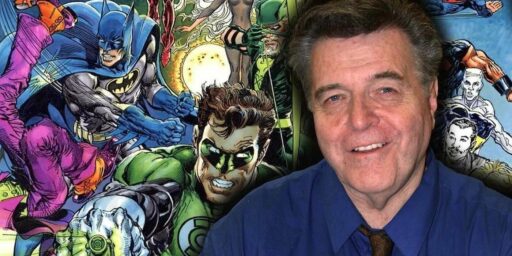
Sad, tho we’ve all gotta go sometime.
Nowadays I mostly hear Carlin as the narrator of my toddler’s Thomas the Tank-Engine videos.
Anderson – same here, though my kids have outgrown Thomas. I always thought it a strange choice to have Carlin narrate Thomas for the US market. I much preferred the Ringo Starr versions for the UK market.